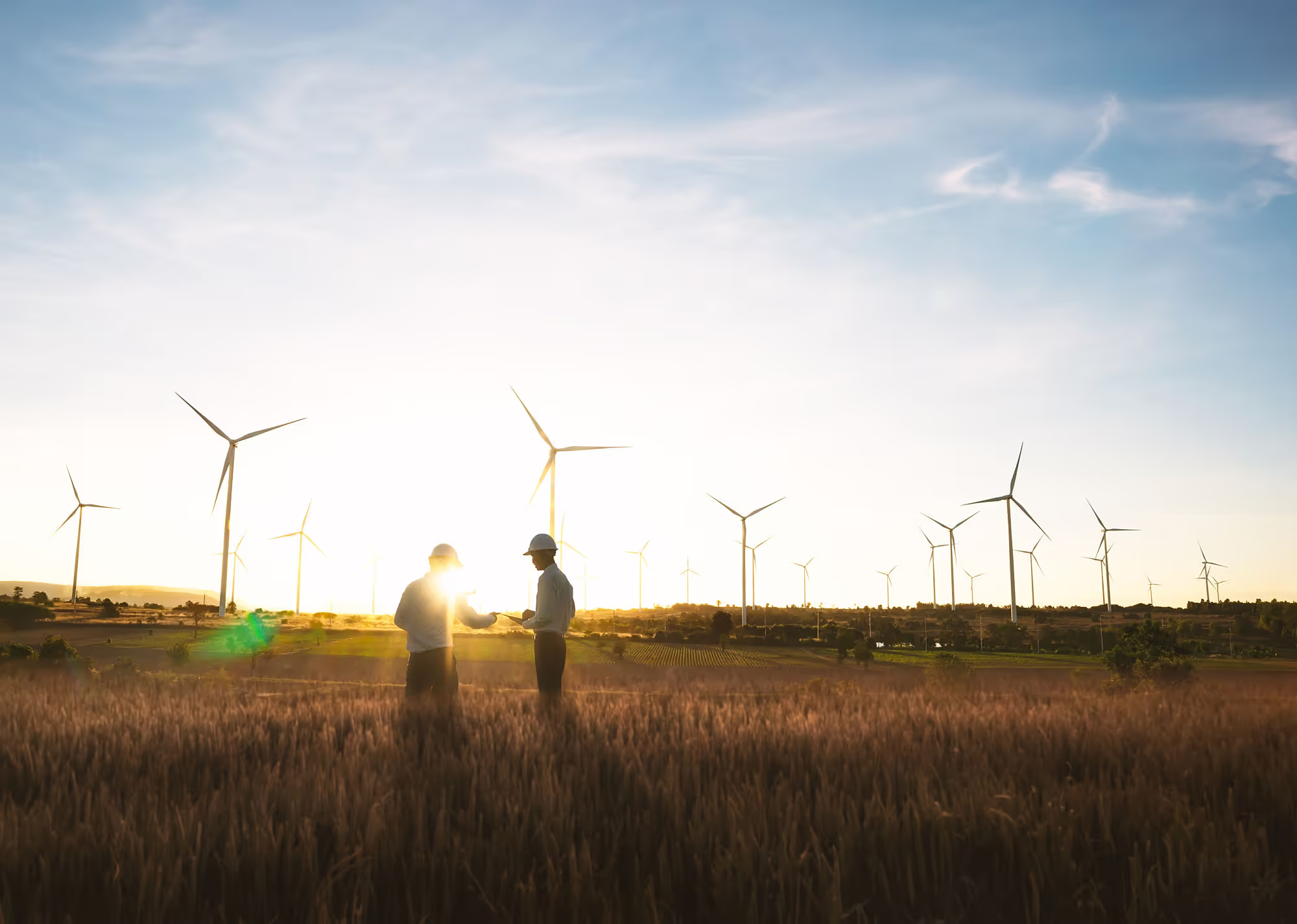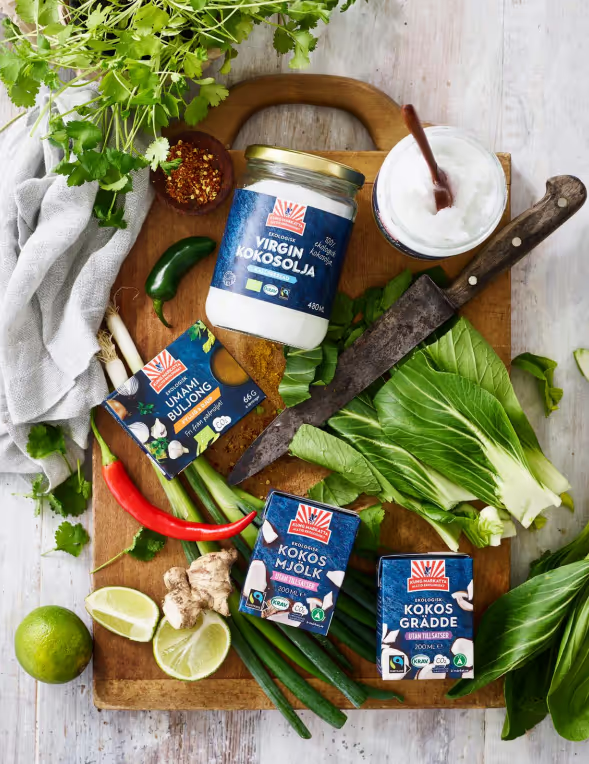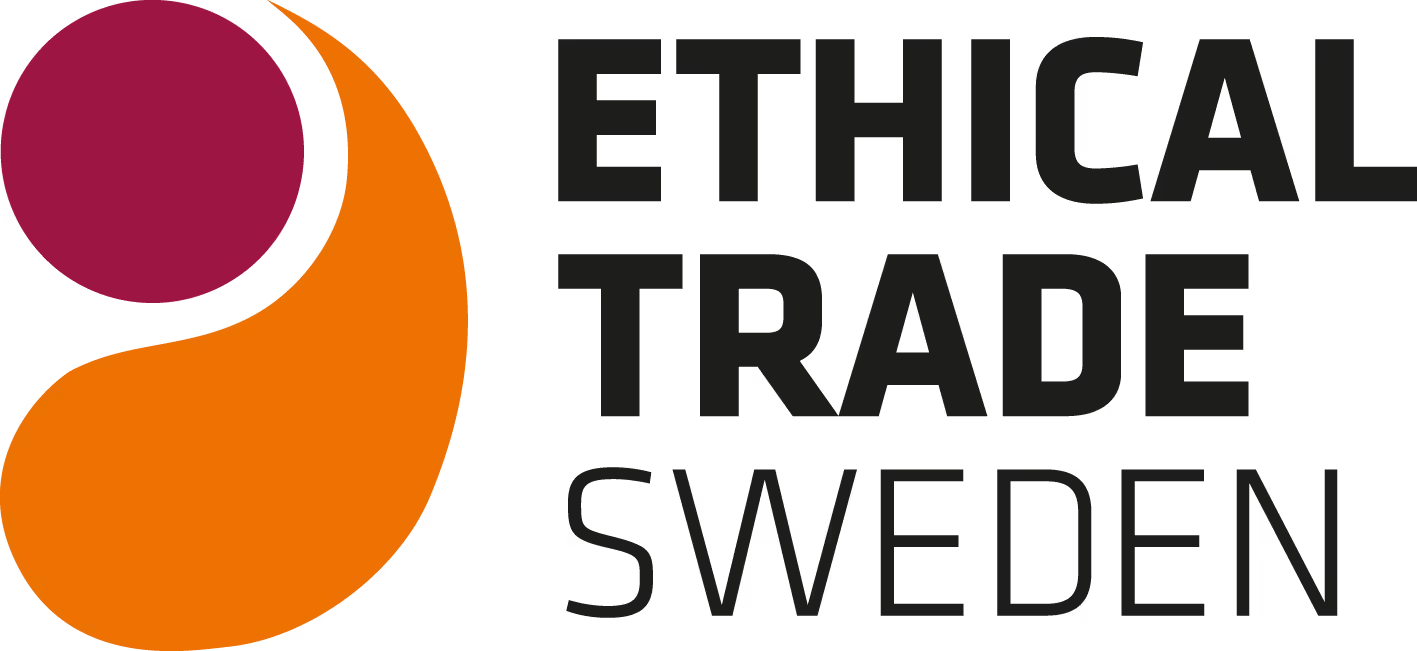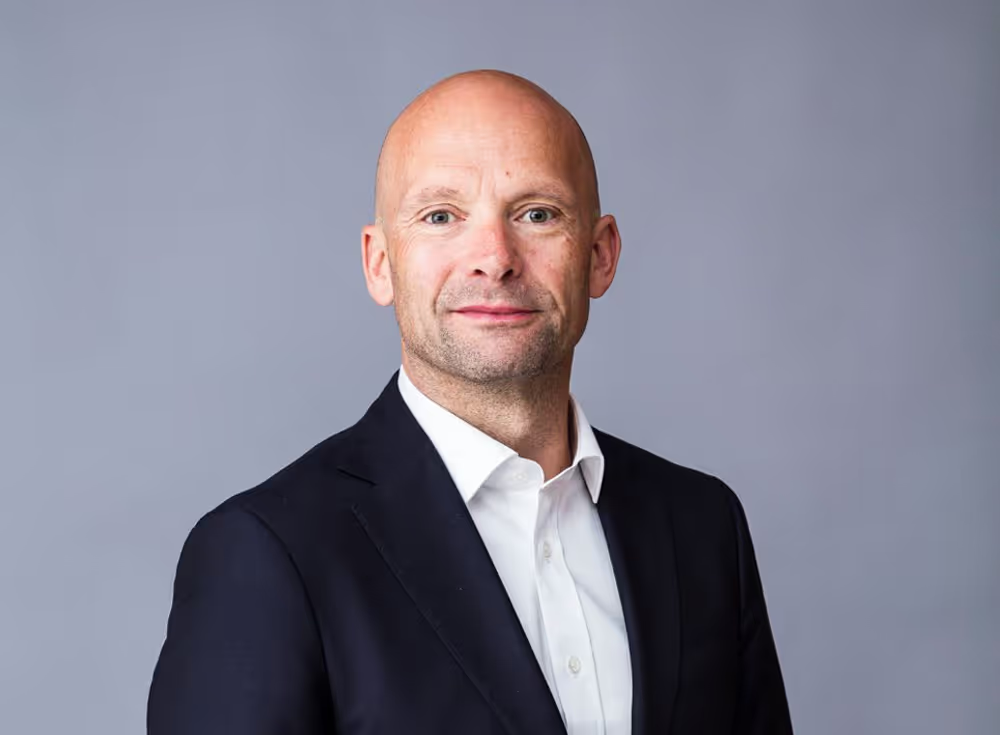Sustainability at Midsona
Sustainability is at the heart of our business.
From sourcing organic raw materials to reducing emissions, we are committed to producing food that nourishes people and protects the planet.
Our ambition
Our approach to sustainability is grounded in our mission to provide healthy food for people and planet as well as our responsibility to contribute to the UN SDG’s. To help us embed sustainability aspects throughout our business, and develop, produce and sell products aligned with our mission we work with setting ambitious goals for our material environmental and social topics. In short we are committed to:



Highlights 2024
Our focus areas
Sustainable brands
Midsona’s business rests on the foundation of promoting a healthy lifestyle through producing and market products that make it easier for people to live a healthier life, and that are sustainable for the planet. There is a growing interest in health, and consumers’ wishes to choose more sustainable options, with people increasingly avoiding animal products, unnecessary additives, and products with poor nutritional content. Midsona seeks to offer options with a low climate footprint, where the aspect of sustainability is included from crop to finished product.

What we do in this area
1
Almost 100% of Midsona’s product range is vegetarian or plant-based, to fuel and meet the growing demand for healthier, sustainable diets that prioritize eating more vegetarian and plant-based.
2
It has never before been more pressing to preserve the Earth’s ecosystems and the biodiversity that is essential to life on the planet. Midsona offers a wide range of products that make a positive contribution in various ways to the environment and biodiversity, including offering EU organic certified raw materials and products, as well as use other product certifications with a positive environmental or social impact, such as KRAV, Vegan, ECOCERT, Bioland, FoS, Fairtrade and Demeter.
3
Packaging plays an important role in Midsona's ability to reduce the Group's environmental impact while delivering high quality products contributing to our mission. Midsona’s overall goal is to follow existing recycling opportunities without sacrificing product durability. Demands for circular alternatives are increasing among consumers, customers and decision-makers. Midsona’s Climate Transition Plan for achieving the 1.5 degree target also requires increased circularity for all packaging materials. That means striving for 100% recyclable packaging and 100% recycled packaging, regardless of material type, starting with ensuring 100% recyclable plastic packaging by 2025 for the Group.
This area contributes to the following UN sustainable development goals:

Healthy work environment
We believe that a healthy and sustainable work environment is a prerequisite for a healthy life. Midsona shall be a company that cares for people and the planet, where human rights and decent working conditions are a matter of course. This applies to Midsona's entire organisation, business partners and all other business relationships in the Group's value chain. Accordingly, Midsona endeavors to cultivate a healthy, sustainable, safe and equal workplace that offers a balance between work life and private life.

What we do in this area
1
Midsona promotes a safe and healthy work environment by preventing work-related injuries and ill-health, supporting employees with measures like technical upgrades, digital tools, and remote work solutions, as well as through health promoting activities.
2
Midsona fosters an open, efficient, and performance-driven culture striving in supporting personal and professional development through continuous skill development and inspirational leadership. Through a strong corporate culture permeated by the Group’s common core values: Care, Drive, Pride and Trust, Midsona is set to generate positive effects in terms of creativity, innovation, motivation and growth.
3
Midsona seeks to be an equal, diverse, and inclusive workplace with balanced age and gender representation and equal conditions and opportunities available to all employees, ensuring zero tolerance for discrimination or harassment.
This area contributes to the following UN sustainable development goals:

Responsible sourcing
To be able to deliver safe and responsibly produced products, Midsona’s first step must be to purchase responsibly produced raw materials. Responsible sourcing is one of Midsona’s largest areas of influence regarding sustainability, and the Group seeks to always work with sustainable suppliers and promote healthy and safe working conditions, as well as respecting human rights throughout the supply chain.
Midsona ensures all raw materials are sustainably and ethically produced.
Partners must adhere to healthy, safe working conditions and respect human rights.
Responsible sourcing drives Midsona’s largest sustainability impact across the supply chain.

What we do in this area
1
Midsona has identified the Group’s extensive and complex global supply chains as a potential risk for negative effects in terms of human rights, social criteria and the environment. Food systems are fragmented, for example, and embody major disparities in socio-economic development and living conditions. By adhering to OECD’s Human Rights Due Diligence framework Midsona takes measures to prevent and mitigate risks in the Group’s global supply chains, and to primarily address the potentially negative effects. Processes are continuously developed to further strengthening the work within this area in all the steps of the OECD framework.
2
Midsona focuses on plant-based, certified raw materials to protect biodiversity and promote sustainable agriculture, forestry, and fishing. Apart from a big focus on organic certifications, efforts include avoiding GMOs, sourcing FSC certified paper, and supporting sustainable fishing through Friends of the Seas certified (or similar) raw materials.
3
Midsona builds close relationships with suppliers to ensure sustainability, transparency, and ethical standards. Goals include classifying all strategic suppliers by 2025 and requiring all suppliers to sign Midsona’s Code of Conduct. Risk assessments and local partnerships strengthen supply chain control.
4
Midsona strives to be a strategic, long-term partner to its suppliers and a reliable player for supporting sustainable societal and environmental development in the Group’s supply chain minimizing impact and improving environmental and social conditions. Midsona’s ambition is to combine the Group’s purchasing of strategic raw materials with the promotion of climate, biodiversity, environmentally friendly agriculture and social commitment. Doing so also provides improved economic sustainability, and thereby greater shared added value.
5
Midsona wants to inspire and make it easier for more people to eat healthy and plant-based foods. Through collaboration with public sector, schools and other food service clients Midsona offers sustainable meal solutions, recipe inspiration, and workshops fostering a more sustainable food culture and supports climate-conscious food practices.
This area contributes to the following UN sustainable development goals:

Safe products and quality
Midsona follows strict quality requirements in all processes to minimise the risk of defects, product recalls orproduct liability claims. Regular risk analyses, audits, and clear action plans address potential defects, recalls, and quality issues early. All suppliers must meet the Group’s requirements for product safety and any complaintsare registered at an early stage in Midsona’s quality assurance system, allowing proactive measures to be taken.

What we do in this area
1
Midsona conducts annual risk assessments of suppliers, aiming for 100% risk classification to ensure safe and high-quality products by 2025.
2
Midsona ensures all production units meet international standards:1. Food: GFSI certification
2. Cosmetics : ISO 22716Exceptions apply only to minor units with appropriate quality systems.
This area contributes to the following UN sustainable development goals:

Efficient use of resources
Resource efficiency is a necessity, both for Midsona’s operations and the environment. By applying a clear roadmap for reducing greenhouse gas emissions and contributing to a low-carbon economy, Midsona seeks to minimise the impact of its operations, value chain and products on the climate and environment through the Group's climate change strategy.

Targets
What we do in this area
1
Midsona’s climate targets are approved by SBTi, aiming for net-zero emissions by 2045 and aligning with the Paris Agreement’s 1.5°C:
Overall Net-Zero Target: Midsona AB (publ) commits to reach net-zero greenhouse gas emissions across the value chain by 2045.
Near-Term Targets: Midsona AB (publ) commits to reduce absolute scope 1 and 2 GHG emissions 42% by 2030 from a 2022 base year. Midsona AB (publ) also commits to reduce absolute scope 3 GHG emissions from capital goods, fuel- and energy-related activities, upstream transportation and distribution, waste generated in operations, business travel, employee commuting, downstream transportation and distribution and end-of-life treatment of sold products by 42% within the same timeframe. Midsona AB (publ) further commits that 70% of its suppliers by spend, covering purchased goods and services, will have science-based targets by 2028.
FLAG: Midsona AB (publ) commits to reduce absolute scope 3 FLAG GHG emissions 30.3% by 2030 from a 2022 base year.* Midsona AB (publ) also commits to no deforestation across its primary deforestation-linked commodities, with a target date of December 31, 2025.
Long-Term Targets: Midsona AB (publ) commits to reduce absolute scope 1 and 2 GHG emissions 90% by 2045 from a 2022 base year. Midsona AB (publ) also commits to reduce absolute scope 3 GHG emissions 90% within the same timeframe.
FLAG: Midsona AB (publ) commits to reduce absolute scope 3 FLAG GHG emissions 72% by 2045 from a 2022 base year.*
*Target includes FLAG emissions and removals
Read our SBTi approval letter here.
2
As an important step in Midsona's work to reduce greenhouse gas emissions, the ambition is to reach net-zero emissions by 2045. Midsona has adopted a Climate Change Strategy, which includes a Climate transition plan that has been developed to set out the needed steps to reach the goal.
Read our climate transtion plan here.
3
Midsona actively works to reduce waste, through sorting, recycling, and reusing materials, in both production and office operations.
4
An important waste stream to reduce emissions within the food system comes from reducing food waste. Midsona actively works to reducing food waste and increasing reuse of food waste through improved planning and inventory management, donations and other solutions that contributes to the goal, and at the same time supports the UN’s Agenda 2030 and Sweden’s milestones for sustainable food systems.
5
Midsona focuses on minimizing water use in production, especially in water-scarce regions like Spain, where improvements significantly reduce total consumption.
6
An important component to reduce green house gas emissions is minimizing energy use. Midsona focuses on energy efficiency with the goal to reduce its energy use to a minimum and for remaining energy used, all proprietary operations shall use 100 percent renewable energy. Midsona aims to reduce overall energy consumption by reusing energy, identifying the most energy-efficient solutions for our facilities and improving energy-intensive processes. Besides purchasing renewable wind and hydro-power, solar energy is also generated by the Group’s own solar panel installations.
This area contributes to the following UN sustainable development goals:

Efficient transport
Transport is one of Midsona’s largest sources of green house gas emissions after purchased goods and services. Accordingly, the group works actively to reduce its transport footprint through several measures such as fossil free solutions, different transport options from truck, e.g. train and ship, as well as optimizing transports, through e.g. packaging and frequency.

What we do in this area
1
Midsona outsources distribution to third-party providers, making it part of Scope 3 emissions and the Group’s climate impact across the value chain. Our climate transition plan sets out the way forward and the focus is finding fossil free solutions by 2030 for the Group for self-contracted transports. Midsona has further committed to DLF’s Transport Initiative 2025, and in the Nordics the goal is for achieve fossil free transports by 2025.
2
Midsona is striving to reduce the amount of business travel. This offers savings as well as efficiency gains, but above all, it reduces the Group's Scope 3 environmental impact in the value chain and is in line with the Group's climate targets. Prioritizing digital meetings is one important way, as well as carefully choosing mode of transportation. For company cars the transition to electrical cars has started, with updated car policies being implemented.
This area contributes to the following UN sustainable development goals:

Sustainability is at the heart of our business.
From sourcing organic raw materials to reducing emissions, we are committed to producing food that nourishes people and protects the planet.
Recognitions & memberships




In 2024 we were once again classified as one of the top 400 listed companies globally for our climate strategy and leadership, having achieved CDP’s highest grade ‘A’ among approximately 21,000 participating companies.

Midsona has been recognized as one of the most sustainable listed companies in the ranking Hållbara bolag made by Lunds Univeristy, Dagens Industry and Aktuell Hållbarhet.



Sustainability governance
Overall, Midsona's sustainability governance involves how the Group handles social and environmental issues, risks and opportunities, as well as the promotion of long-term sustainability and creating value for stakeholders. Based on this work, Midsona sets clear goals supported by dedicated leadership and attention to societal changes, such as regulatory changes, and with consideration for the expectations of the Group’s stakeholders.

Reports & other documents
Our sustainability report is integretaded in our Annual Report. Browse our reports here.




















